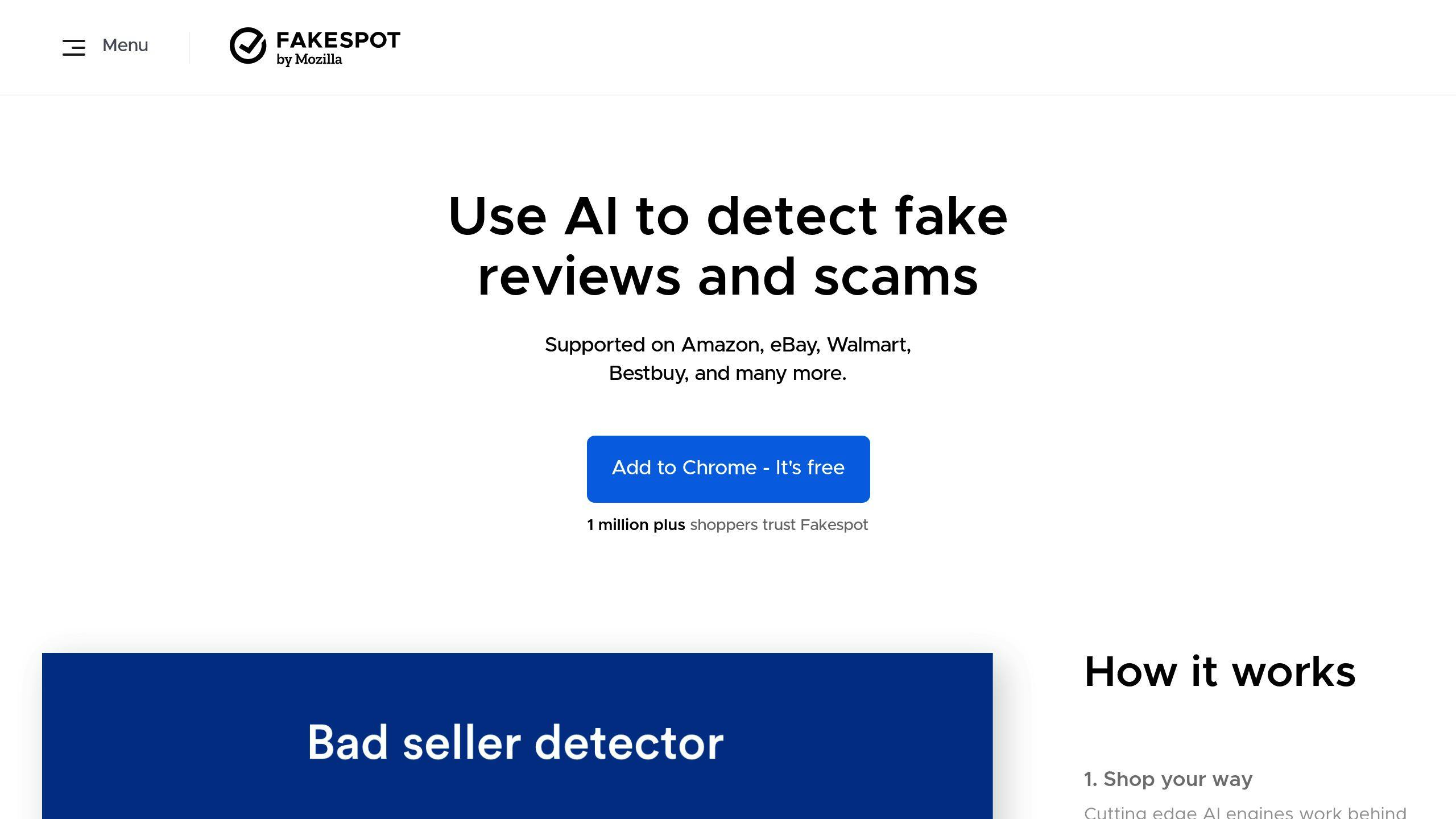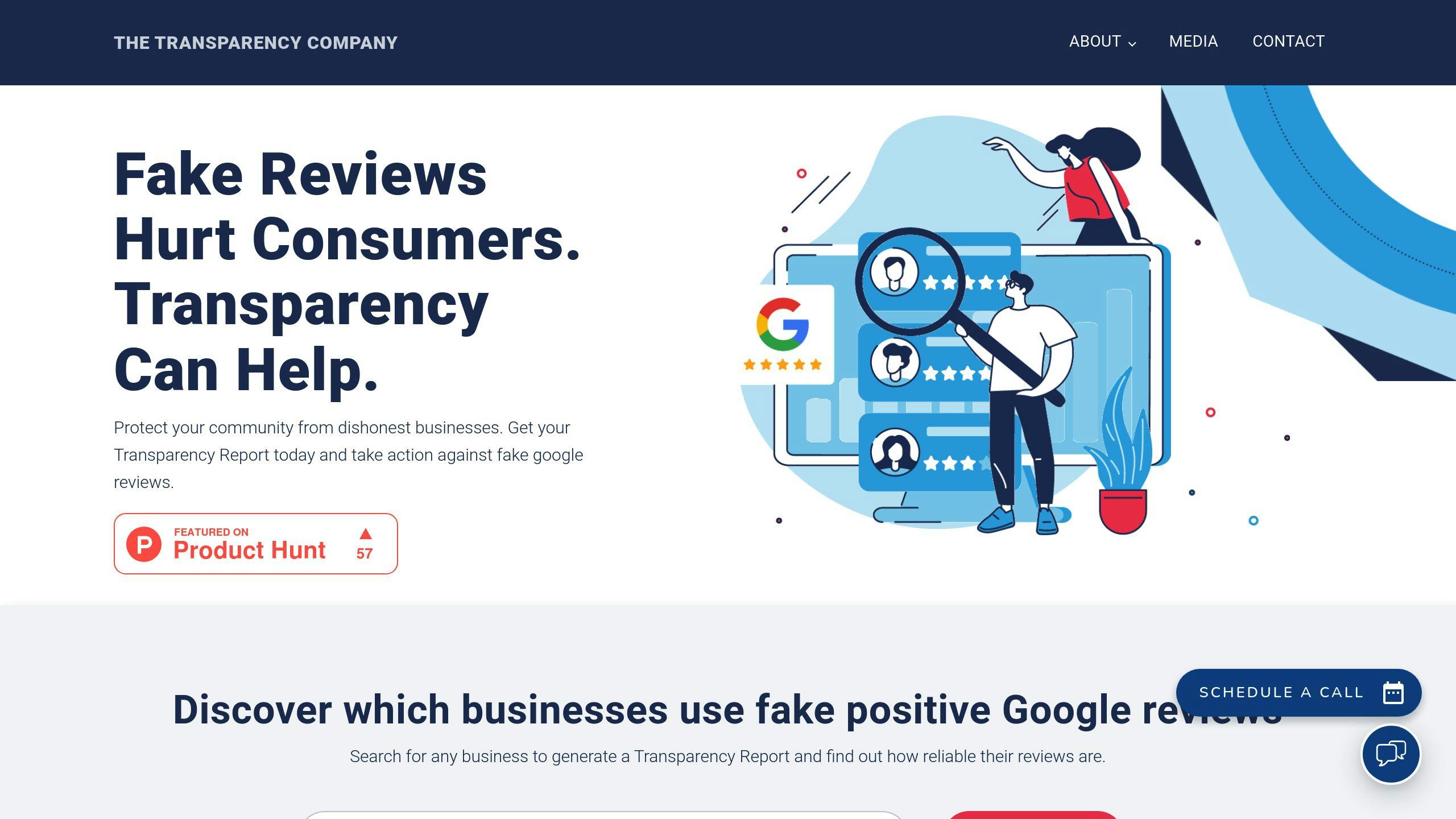Fake reviews are costing businesses $152 billion globally. Here's how to spot them:
Key signs of fake reviews:
- Extreme language (overly positive or negative)
- Vague comments lacking details
- Copy-paste phrases across multiple reviews
- Suspicious timing (e.g., floods of reviews)
- Sketchy profiles (generic names, no photos)
Tools to detect fake reviews:
- Fakespot: AI-powered review checker (Amazon, eBay, Best Buy)
- ReviewMeta: Analyzes Amazon reviews in-depth
- The Transparency Company: AI tool for brands
Manual ways to spot fakes:
- Check reviewer profiles
- Look for verified purchases
- Study writing styles
- Examine review dates
- Compare multiple reviews
Quick Comparison:
| Platform | Key Features | Red Flags |
|---|---|---|
| AI detection, blocked 170M fakes in 2023 | Generic usernames, stock photos, review clusters | |
| Amazon | Verified Purchase badge | Short 5-star reviews, overly positive language |
| Yelp | Review filters, trusted reviewers | New accounts, vague details, lack of photos |
| Personal profiles | Incomplete profiles, few friends, review-only posts |
Remember: Use multiple methods to verify review authenticity. Stay vigilant and trust your instincts when reading online reviews.
What Are Fake Reviews?
Fake reviews are phony testimonials meant to influence buyers. They're a big problem online, with up to 40% of reviews potentially fake.
Types of Fake Reviews
- Positive fakes: Boost a business's image
- Negative fakes: Harm competitors
- Paid reviews: Bought in bulk
- Incentivized reviews: Given for freebies or discounts
Why People Write Them
- To increase sales
- To hurt competitors
- For money
- To counter bad feedback
- To support new products
The Damage They Cause
Fake reviews can:
- Destroy trust
- Cost businesses money
- Lead to legal issues
- Harm reputations
"Your brand isn't what you say it is — it's what Google says it is." - Unknown
This quote shows how online reviews shape business reputations.
Real-life example: In 2023, an author lost her book deal after writing fake negative reviews about other authors.
| Platform | Fake Reviews Caught (2022) |
|---|---|
| Amazon | 200 million |
| Tripadvisor | 1.3 million |
These numbers show how big the problem is.
Both businesses and customers need to watch out for fake reviews. Knowing what they are and why they exist is key to fighting this growing issue.
Signs of Fake Reviews
Spotting fake reviews isn't rocket science. Here's what to look out for:
Extreme Language
Fake reviews often go overboard. They're either gushing with praise or dripping with hate.
"If a review sounds like a commercial or a rant, be suspicious." - William DiAntonio, Reputation911 CEO
Vague Comments
Real reviews get into the nitty-gritty. "Amazing product!" without any backup? That's fishy.
Copy-Paste Jobs
Seeing the same phrases pop up in multiple reviews? That's a red flag. It's likely someone's churning out fake reviews en masse.
Weird Timing
A flood of reviews out of nowhere? That's not normal, especially right after a product launch.
| Suspicious Timing | What It Might Mean |
|---|---|
| Bunch of 5-stars on one day | Fake review campaign |
| Surge after product debut | SEO manipulation attempt |
| Sudden negative avalanche | Coordinated attack |
Sketchy Profiles
Fake reviewers often have tell-tale signs:
- Names like "John D."
- No profile pic or obvious stock photo
- Only glowing or scathing reviews
- Reviews for random products worldwide
Real talk: In 2023, TripAdvisor caught and axed 1.3 million fake reviews. It's a big problem.
To protect yourself:
- Check out reviewer profiles
- Look for specific details
- Watch out for sales-pitch language
- Pay attention to review patterns
Tools to Find Fake Reviews
Let's look at some tools that help spot fake reviews:
Fakespot

Fakespot uses AI to check reviews on Amazon, eBay, and Best Buy. It grades reviews from A to F based on how real they seem.
What it does:
- Checks spelling and grammar
- Looks for weird patterns in when reviews are posted
- Has a browser extension for easy use
Remember: Fakespot's grade is about the reviews, not the product. Use it with other research methods.
ReviewMeta
ReviewMeta focuses on Amazon reviews only. It digs deep into the details.
It does these things:
- Recalculates star ratings
- Flags suspicious reviewer behavior
- Gives new ratings after removing possible fake reviews
Here's an example:
ReviewMeta looked at Good'N'Fun Triple Flavored Rawhide Kabobs:
- Original rating: 4.8 stars
- New rating: 4.5 stars
- 43% of reviews looked fishy
The Transparency Company

This tool uses AI to find fake reviews for brands. It:
- Calls reviews "real" or "fake"
- Looks at tons of fake business reviews
- Helps brands see what shady stuff competitors are up to
Quick Comparison
| Tool | Where It Works | Cool Feature | Best Use |
|---|---|---|---|
| Fakespot | Amazon, eBay, Best Buy | Letter grades | Fast checks |
| ReviewMeta | Just Amazon | Deep dive | Serious Amazon research |
| The Transparency Company | Many places | AI detection | Brands wanting to prove they're legit |
These tools are helpful, but they're not perfect. As Tommy Noonan from ReviewMeta says:
"Nothing is ever perfect."
Use these tools as part of your fake review detective work, not as your only method.
Manual Ways to Spot Fake Reviews
You don't always need fancy tools to catch fake reviews. Here's how to do it yourself:
Check Reviewer Profiles
Look for these red flags:
- No review history
- Only extreme ratings
- Generic usernames
- Missing profile pictures
Fun fact: Yelp axed over 26,000 rule-breaking reviews in 2022. Many had sketchy profiles.
Look for Verified Purchases
On Amazon, the "Verified Purchase" badge is your friend. No badge? Be extra cautious.
Study Writing Styles
Watch out for:
- Super short, detail-free reviews
- Over-the-top language
- Copy-paste vibes across multiple reviews
- Sloppy writing
Real reviews? They talk about specific features and personal experiences.
Check Review Dates
Be suspicious of:
- Review clusters on a single day
- Pre-launch reviews
- Sudden review spikes
William DiAntonio, CEO of Reputation911, puts it bluntly:
"Be skeptical of any review that gives extreme praise or criticism without any reasons to back it up."
Compare Multiple Reviews
| Real Reviews | Fake Reviews |
|---|---|
| Mixed ratings | Mostly 5-star or 1-star |
| Specific details | Vague praise or complaints |
| Varied writing | Similar wording |
| Spread out over time | Date clusters |
Tips for Different Review Platforms
Each platform has its own way of handling fake reviews. Here's what to look for:
Google Reviews
Google's AI is getting better at catching fakes. In 2023, they blocked 170 million fake reviews. But some still slip through. Watch out for:
- Generic usernames like "John123"
- Stock image profile pics
- Clusters of 5-star reviews in a short time
Use Google My Business to report suspicious reviews. More evidence helps your case.
Amazon
Look for the "Verified Purchase" badge. No badge? Be skeptical. Also watch for:
- Short 5-star reviews
- Overly positive language
- Similar wording across reviews
Amazon removed over 200 million fake reviews in 2022.
Yelp

Yelp uses filters and marks trusted reviewers. Still, be alert:
- New accounts with only 1-2 reviews
- Vague praise or complaints
- Lack of photos in reviews
Yelp removed over 26,000 rule-breaking reviews in 2022.
Facebook's tricky because it's tied to personal profiles. Look for:
- Incomplete profiles
- Few or no friends
- Profiles with only product reviews
| Platform | Key Features | Red Flags |
|---|---|---|
| AI detection, 170M blocked (2023) | Generic usernames, stock photos, review clusters | |
| Amazon | Verified Purchase badge | Short 5-star reviews, overly positive language |
| Yelp | Review filters, trusted reviewers | New accounts, vague details, lack of photos |
| Personal profiles | Incomplete profiles, few friends, review-only posts |
sbb-itb-0fc0b25
Legal and Ethical Issues
Online reviews aren't just about spotting fakes. They're a legal minefield. Let's break down the rules and ethics of review management.
FTC Rules
The FTC isn't messing around with fake reviews. Here's the deal:
- New rule announced August 14, 2023
- Effective October 21, 2024
- Violations? Up to $51,744 per instance
What's banned:
| Don't Do This | It Means |
|---|---|
| Fake Reviews | Making, buying, or selling phony reviews |
| Pay-for-Play | Offering perks for good (or bad) reviews |
| Hidden Connections | Not disclosing relationships in reviews |
| Fake Independence | Pretending your controlled site is independent |
| Bullying | Using baseless legal threats to kill bad reviews |
Business Risks
Fake reviews aren't just wrong. They're dangerous:
- Lawsuits for false advertising
- FTC fines: $10,000 per violation
- Reputation? Destroyed
"The FTC can and will issue fines against businesses caught using fake reviews." - Ethan James, Financial Writer at Lendza
Ethical Review Management
Do it right:
1. Ask, Don't Push: Want reviews? Ask. But don't pressure or bribe.
2. Be Transparent: Connected to a reviewer? Say so.
3. Always Respond: Good or bad, answer every review professionally.
4. No Censorship: Don't delete bad reviews unless they break rules.
5. Stay Vigilant: Use tools like ReputationDash to keep tabs on your reviews.
Tips for Businesses
Smart businesses know how to get and handle real reviews. Here's the scoop:
Getting Real Feedback
Want honest reviews? Try these:
- Ask when it makes sense. Like after a good meal at a restaurant.
- Use texts. People open them way more than emails.
- Make it simple. Give a direct link or QR code to your review page.
Kaitlin Martin from Choice Windows says: "We give customers a small card with a QR code to our Google My Business page after every job."
Answering Reviews
Reply to ALL reviews within 24 hours. Why? Over 75% of people expect it, according to The Sprout Social Index™ 2022.
| Do | Don't |
|---|---|
| Say thanks | Ignore bad feedback |
| Talk about specifics | Use cookie-cutter responses |
| Offer fixes | Fight or make excuses |
Checking Review Authenticity
Spot fake reviews like this:
1. Look for weird stuff:
- Tons of reviews all at once
- Reviews that sound the same
- One-hit wonder reviewers
2. Try tools like Fakespot or ReviewMeta
3. Check out reviewer profiles for fake account red flags
Using ReputationDash

ReputationDash helps manage your online rep:
- See reviews from everywhere in one spot
- Get pinged about new reviews
- Figure out how customers feel
- Catch potential fake reviews
Jasz Joseph from SyncShow shares: "We use an NPS survey every quarter. If a client scores us high, we ask if they'd write a good review."
Tips for Consumers
Smart shoppers use reviews to make good choices. Here's how:
Check Multiple Sources
Don't stick to one site for reviews. Look around:
- Amazon, Walmart, and Target have reviews
- Each site might show different feedback
- More sources = better picture
Focus on Detailed, Verified Reviews
Long, specific reviews from real buyers are gold. They give you the real scoop.
| Look For | Why It Matters |
|---|---|
| Verified purchase | They actually bought it |
| Specific details | They used it |
| Pros and cons | More trustworthy |
| Recent date | Product might've changed |
Use Review Analysis Tools
These tools can help spot fakes:
- Fakespot: Grades Amazon, Walmart, and eBay reviews
- ReviewMeta: Analyzes Amazon reviews
"Look at a variety of sources, not just one website or platform." - Michael Atleson, FTC Bureau of Consumer Protection
Trust Your Gut
If something seems off, it probably is. Watch out for:
- Too many 5-star reviews
- Reviews that sound like ads
- Lots of reviews on the same day
82% of U.S. adults check reviews before buying. But 62% think they've seen fake ones in the last year. Stay sharp!
Conclusion
Fake reviews are still a big headache for businesses and shoppers. In 2022, Yelp kicked out over 26,000 rule-breaking reviews. TripAdvisor caught 1.3 million fakes in 2023. The battle's far from over.
Both companies and customers need to stay on their toes:
| Businesses | Customers |
|---|---|
| Monitor review sites regularly | Check multiple sources |
| Encourage genuine feedback | Look for detailed, verified reviews |
| Respond to all reviews | Use tools like Fakespot |
The future of review checking? It's a tech race:
- AI's getting better at spotting fakes
- But it's also writing more convincing fake reviews
- We'll need smarter tools to keep up
"The online review world is the wild west, and there is no sheriff." - Kay Dean, Fake Review Watch founder
As fake reviews evolve, so must our detection methods. Stay alert, use the right tools, and trust your instincts when reading reviews.
FAQs
What tool is used to identify fake reviews?
Fakespot is a go-to tool for spotting fake reviews. It uses AI to grade review reliability from A to F. Mozilla's 2023 acquisition of Fakespot expanded its reach beyond Amazon.
How to use Fakespot:
- Paste a product link into Fakespot's analyzer
- Run a report
- Or use the browser extension for quick checks
Pro tip: Combine Fakespot with tools like ReviewMeta for a fuller picture.
Which of the following is a good way to recognize fake online reviews?
Here are key signs of fake reviews:
| Red Flags | What to Check |
|---|---|
| Reviewer Profile | Name, picture, review history |
| Writing Style | Spelling, grammar, generic language |
| Review Timeline | Many reviews in a short time |
| Content | Lack of detail or too many specifics |
| Sentiment | Extremely positive or negative tone |
Do companies post fake reviews?
Yes, some do. But it's illegal and risky.
The FTC is getting tough:
- New rule in August 2024 bans fake reviews
- Fines up to $50,000 per fake review seen
- A supplement maker got hit with a $600,000 fine for fake Amazon reviews
"Companies posting fake reviews often run the risk of disappointing their own customers. Most of the time, their offerings don't match the fabricated glowing reviews that customers find online." - Michael Atleson, FTC Staff Attorney
Smart businesses focus on real feedback instead of risking fines and trust.


